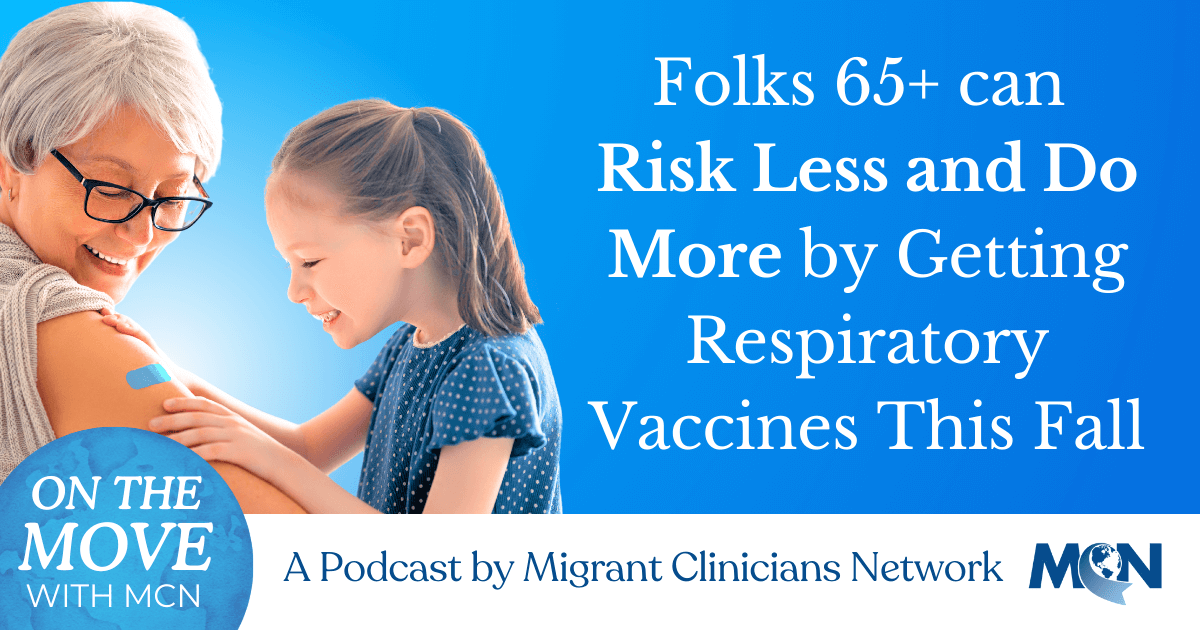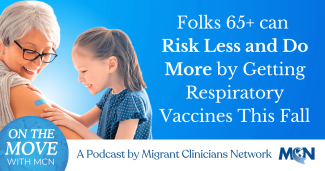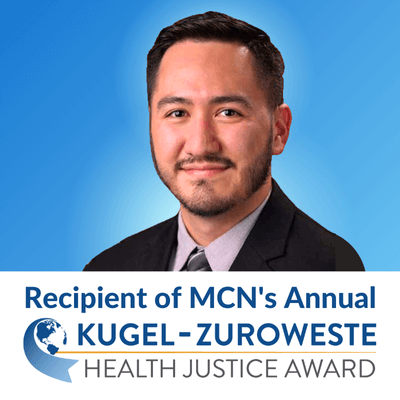Helping Migrant & Immigrant Patients Opt Out of Flu Season with the ‘Risk Less. Do More’ Campaign

Flu season is here – but the increased risk of illness includes not just influenza but other respiratory diseases like Respiratory Syncytial Virus (RSV) and COVID-19. The US Department of Health and Human Services (HHS) is seeking to combat higher risk factors for the most vulnerable patients by partnering with Migrant Clinicians Network (MCN) in their ‘Risk Less. Do More’ campaign. The campaign seeks to reach those over 65, those who are pregnant, and those who are members of underserved communities, such as immigrant and migrant patients.
“The whole idea is that, literally, they want people to have less risk so that they can do more of the things that they like," shared Renai Edwards, MPH, MCN’s Director of Training and Technical Assistance, and lead on the project. According to Edwards, the campaign has a variety of resources, including videos, fact sheets for clinicians to use with their patients and to send home to their families, and other resources to assist with directly reaching communities. Many of the resources focus on those 65 or older as well as those who are pregnant, and are offered in a variety of languages, including Spanish. "'Risk Less. Do More' is really trying to use uplifting, colorful, and, in particular, family-oriented messages for diverse communities, to provide resources and help increase awareness and access to respiratory vaccines,” Edwards said.
Why are vaccines so critical for these populations in particular?
According to Laszlo Madaras, MD, MPH, MCN’s Chief Medical Officer, older adults are especially vulnerable due to the likelihood of multiple co-morbidities. “Sometimes… they're part of our genetic inheritance from our parents,” he noted, noting that some people are more likely to develop diabetes or lung disease as a result of their genetics. As patients get older, Dr. Madaras stressed that the accumulation of co-morbidities increases the likelihood that patients will "get sicker, suffer more, and possibly die.” These co-morbidities, Dr. Madaras said, “will result in a higher risk for diseases such as COVID, such as influenza, such as RSV -- which fortunately are vaccine preventable,” or which reduce the risk of severe disease and death.
For those who are pregnant, a respiratory disease like RSV increases the risk of requiring emergency care, intubation, and miscarriage. The benefits of vaccination, for both the parent and the baby, should be a motivation for many. “[When we] vaccinate the pregnant person… we get some passive immunity that passes through to the infant, so when that infant is born, they already have the advantage of having some of the antibodies that their parent has given them.” Dr. Madaras explained.
For underserved communities, such as immigrants and migrants, the risks are overwhelming. High-risk work environments as well as living environments play a role in these risks. During the COVID pandemic, for example, many essential workplaces like meatpacking warehouses and residents of low-income, crowded housing like on-farm farmworker housing were unable to adhere to recommended CDC guidelines for social distancing, which made them “especially vulnerable,” Dr. Madaras recalled.
MCN’s Goal for ‘Risk Less. Do More’
According to Edwards, MCN’s goal with the campaign is to reach clinicians serving immigrant and migrant communities to spread these messages about respiratory vaccines. “We really want to reach them and make sure that this message is getting beyond the general English-speaking audience that most of the promotion is going to go to,” shared Edwards.
Edwards insists that the entire care team, including community health workers and outreach workers, doctors, physician assistants, nurse practitioners, and office assistants, share information with patients. “We are here as trusted messengers, right? People count on us to bring them the accurate information,” Edwards said, “Having that information and sharing it with them really helps them [when they receive] it from a source that they can trust.”
Risking less, as the slogan goes, allows migrant and immigrant patients to enjoy the holiday season without worry. “Who wants to be in bed sick or potentially in a hospital when you could be having a great time with your loved ones?” reminded Edwards.
Access ‘Risk Less. Do More’ resources, many of which are designed for migrant and immigrant communities:
Main Spanish HHS Campaign Page: https://www.hhs.gov/es/risk-less-do-more/index.html or www.risklessdomore.hhs.gov
- Spanish Resources for Health Care Providers: https://www.hhs.gov/es/risk-less-do-more/for-health-care-providers/index.html
- Spanish Campaign Ads: https://www.hhs.gov/es/risk-less-do-more/for-health-care-providers/index.html
Main English HHS Campaign Page: https://www.hhs.gov/risk-less-do-more/index.html
- English Campaign Resources for Health Care Providers: https://www.hhs.gov/risk-less-do-more/for-health-care-providers/index.html
- English Campaign Ads: https://www.hhs.gov/risk-less-do-more/campaign-ads/index.html
Access many more resources in this campaign at: www.cdc.gov/risklessdomore
To listen to more about this topic:
Podcast Episode on Migrant Clinicians Networks’ ‘On the Move’ podcast, a podcast dedicated to providers and health advocates who work with vulnerable populations, including migrants and immigrants: Folks 65+ can Risk Less and Do More by Getting Respiratory Vaccines This Fall | Migrant Clinicians Network
English Webinar: Why Promote Pan-Respiratory Disease Vaccines for Adults 65+ | Migrant Clinicians Network
Spanish Webinar: Por qué promover vacunas contra las enfermedades respiratorias comunes en adultos mayores de 65 años | Migrant Clinicians Network
This publication is supported by ForsMarsh for the ‘Risk Less. Do More’ campaign. The contents are those of the authors and do not necessarily represent the official views of, nor an endorsement, HHS.
- Log in to post comments





